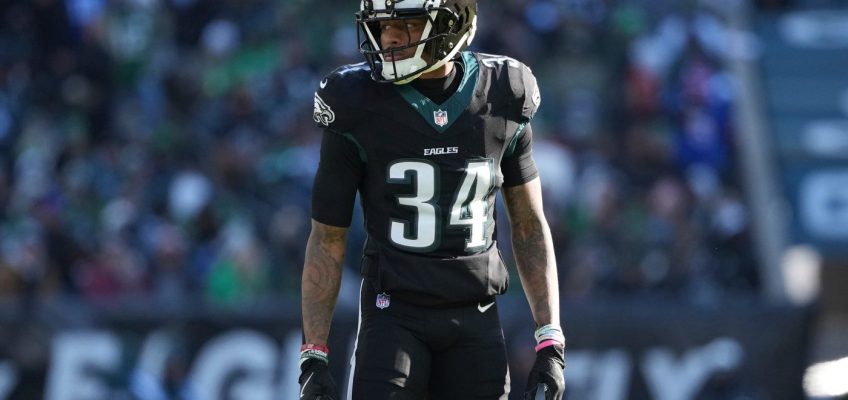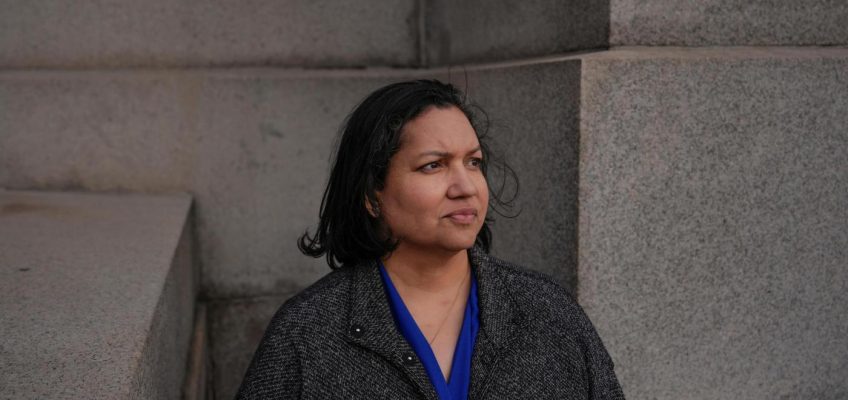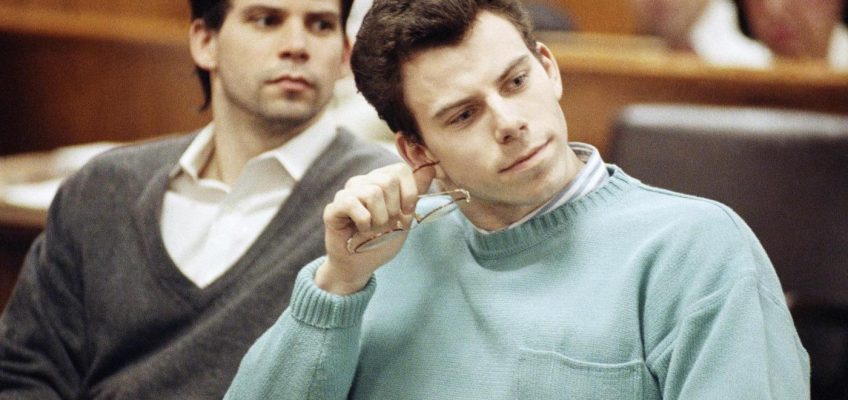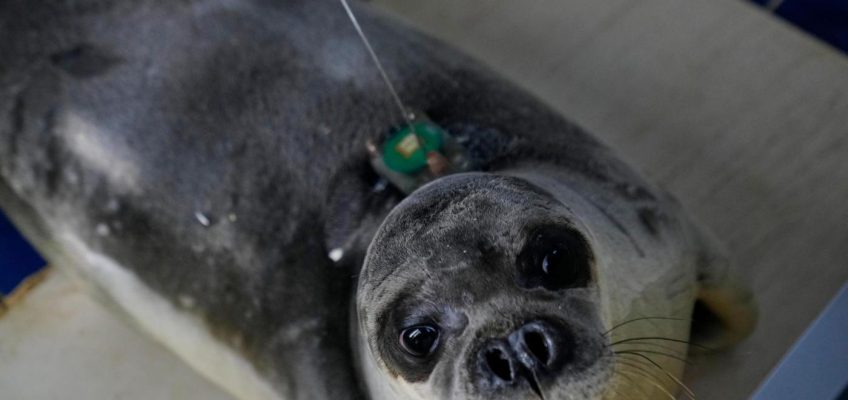By ELENA BECATOROS
ATHENS, Greece (AP) — Panagis hauls himself out of the pool at a rehabilitation center in Greece and scurries over for a delectable lunch: whole mackerel. It’s been about three months since the orphaned seal pup was found struggling in the coastal waters of Cyprus. Soon, he’ll be well enough to go home.
China strikes back at Trump tariffs with 15% levies targeting US farmers
Father of missing US student Sudiksha Konanki asks for wider investigation in Dominican Republic
Guatemala’s Volcano of Fire erupts and forces evacuations
What makes Greenland a strategic prize at a time of rising tensions? And why now?
Ontario slaps 25% increase on electricity exports to US in response to Trump’s trade war
Panagis is one of dozens of Mediterranean monk seals, or Monachus monachus, that have been nursed back to health by Greece’s MOm, a charity dedicated to the care and protection of the rare marine mammal whose population had dwindled so dramatically that at one point it faced extinction.
Thanks to conservation efforts, the seals with the big, round eyes and prominent whiskers are now making a remarkable comeback. Nearly half of their estimated global population of 800 live in Greek waters, where the extensive coastline offers an abundance of sea caves that provide shelter for females to rear their young.
From near extinction to recovery
Sleek and remarkably fast in the water, the monk seal is a skillful hunter and can consume up to 3 kilograms (6 pounds) of fish, octopus and squid a day. But it’s not averse to a ready meal, and can rip through fishing nets to steal fish — which led fishermen to view them as pests.
For decades, they were hunted, contributing to a major population decline between the 1960s and 1980s that led the International Union for Conservation of Nature, or IUCN, to list them as critically endangered.
Nikitas Vogiatzis, prepares to feed Panagis, a mediterranean monk seal, at the Attica Zoological Park, in eastern Athens, Greece, Tuesday, Feb. 18, 2025. (AP Photo/Thanassis Stavrakis)
When conservation efforts began in the 1980s, combined with outreach programs to educate the public — and fishermen — “society gradually began to change … and the population began to recover,” said Panagiotis Dendrinos.
Dendrinos, a marine biologist and coordinator of the Hellenic Society for the Study and Protection of the Monk Seal — or MOm — that has pioneered the Monachus monachus conservation program, says the monk seal is the only seal species in the Mediterranean Sea and also “one of the rarest species of seal and marine mammal in the world.”
“To protect an animal like the Mediterranean monk seal in its natural environment, you essentially have to protect the entire marine ecosystem,” he said.
Nikitas Vogiatzis feeds Panagis at the Attica Zoological Park, in eastern Athens, Greece, Tuesday, Feb. 18, 2025. (AP Photo/Thanassis Stavrakis)
Conservation efforts have paid off, and in recent years, the species climbed down a notch on the IUCN’s Red List of threatened species to “endangered.” About a year ago improved one step further, to “vulnerable.”
A unique seal rehab
Usually contacted by members of the public who find an animal in distress, MOm specialists tend to adult seals on location where possible, and transport young seals to the organization’s rehabilitation center housed in the grounds of Athens’ zoo, the Attica Zoological Park, on the outskirts of the Greek capital.
There, the young mammals are looked after by veterinarians, fed a special diet to provide them with the best nutrition and hone their swimming skills in a pool.
Panagis, a monk seal, swims at the Attica Zoological Park, in eastern Athens, Greece, Tuesday, Feb. 18, 2025. (AP Photo/Thanassis Stavrakis)
Their carers give them names — often after the people who found them — but make sure contact with humans is kept to a minimum to prepare the animals for their return into the wild.
The young seals typically stay in the rehab center for several months, until they’ve put on enough weight and their natural hunting instinct kicks in, allowing them to fend for themselves. They are then tagged so they can be tracked, and re-introduced into the wild.
MOm, the only center of its kind in the region, has cared for about 40 seals from far and wide, both on location and in its facilities, Dendrinos said.
“This year, we had a really pleasant surprise,” he said. A female seal that had been treated and released four years ago was spotted nursing a pup.
Planes, boats and cars to the rescue
Panagis was found in Cyprus, near where the body of his mother had been found a few days earlier. Alerted by locals, the organization arranged for the seal to be flown to Athens.
“Transportation is carried out with whatever is available,” said veterinary assistant Nikitas Vogiatzis, shortly after feeding Panagis. “Either by plane, or by boat, or even by taxi. “Konstantina came in a taxi, Panagis by plane, Renos came on a boat,” he said, listing MOm’s most recent wards.
Weighing just under 15 kilograms (33 pounds) when he arrived, the now 3-month-old seal has reached over 40 kilograms (88 pounds). Panagis is nearly ready for his return trip home, which MOm experts hope will happen in May.
Back into the wild
Renos — short for Renos-Pantelis — was found in November in the small Aegean island of Anafi by a nurse and a military conscript whom he was named after.
The seal pup was shipped to MOm’s facility. He got medical treatment and was put on a special diet until he was old enough to move on to solid fish — the mackerel that Panagis is so fond of.
Renos-Pantelis, a five-month old mediterranean monk seal, dives into the water after its release at a beach on the tiny Aegean Sea island of Gyaros, Greece, Monday, Feb. 17, 2025. (AP Photo/Thanassis Stavrakis)
He recovered and on a cold, sunny February day, it was his turn to head back into the wild. MOm personnel loaded him into a crate and whisked him by speedboat to the uninhabited islet of Gyaros, the closest marine protected area to Athens.
The release location is chosen “based on there being enough food, and there being no disturbance by people, which is very important,” said Vogiatzis, the veterinary assistant.
The crate is placed near the water, he said. Then, “you open the door, you say a prayer and you say: ‘So long’.”
Renos’ crate was deposited on a beach and the door opened. The young seal sniffed the air timidly, and waited. Slowly, he inched his way out of the crate, then picked up speed as he belly-hauled his way down the beach, splashed into the sea and was gone.
Associated Press photographer Thanassis Stavrakis in Gyaros, Greece, contributed to this report.




